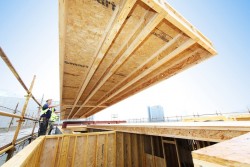Using timber has been recognised as a crucial route to decarbonising our built environment in a new, landmark report from the Environmental Audit Committee (EAC).
The EAC has called on the government to complete a policy roadmap to scale up the use of timber in construction by the end of 2022 – at the latest – warning the UK is already falling behind their EU counterparts when it comes to reducing carbon emissions from the built environment. Over 14 months of inquiry MPs heard from a wide range of experts on the best strategies to decarbonise the built environment – an area which is directly responsible for a quarter of the UK's total carbon emissions – at a total of 177 MtCO2e – and strongly influences up to 42%.
Their report, 'Building to net-zero: costing carbon in construction', warns that despite the commitment of the UK Government to achieve a 68% reduction in the UK's carbon emissions by 2030 compared to 1990 levels, there has been little to no leadership from Government on this issue.
To date, policies from the Government have focused entirely on operational emissions, those relating to day-to-day use of a building such as heating, while the embodied carbon emissions which arise from a building's construction – despite sitting at some 40 to 50 MtCO2e – more than the aviation and shipping industries combined – remain ignored.
Evidence from a range of experts, including the UK Climate Change Committee, leading academics, researchers, architects and engineers showed that using timber in place of concrete, masonry, and steel is one of the most successful strategies to reducing embodied carbon in the built environment. Researchers repeatedly highlighted the carbon saving potential of timber, saying that by replacing "a concrete frame and all brick and block houses with timber frame houses, you can reduce embodied carbon by about half," and highlighting the need to grow the skills to support this shift.
A lack of distinction made between the cladding and primary structure within the ban on the use of combustible materials in the external walls of buildings above 18m was found to be particularly damning for the industry, causing a ripple effect which has set back all forms of timber construction.
Professor Michael Ramage (University of Cambridge) decried the ban noting that modern timber systems can and do deliver sufficient fire resistance within the primary structure, and how 'one government policy [the ban] is making another government policy [net zero], untenable.'
Confederation of Timber Industries chair Alex Goodfellow said: "Timber is already a £10billion supply chain in the UK, which supports 350,000 jobs. It provides economic prosperity in every region of the UK, green employment, thousands of healthy, safe, warm, and beautiful low-carbon homes, and is helping create a sustainable construction industry. By using more wood we can achieve quicker, higher quality, and safer construction, as timber lends itself to modern methods of construction by being manufactured offsite with factory precision, and extend the use of existing building, with light-weight timber structures able to lend additional stories.
Timber Development UK Chief Executive David Hopkins said: "Wood is the only sustainable structural material which can enable substantial decarbonisation of the built environment based on existing business models and proven technology. It can provide vast carbon sinks in our rural areas and carbon stores in our cities. There is widespread industry agreement that using more timber in place of carbon-intensive materials, such as steel, masonry, and concrete, is the best route to reducing carbon emissions from the built environment. This report reflects that and calls on the Government to do more."
Structural Timber Association Chief Executive Andrew Carpenter added: "From Seattle to Stockholm to Sydney, timber frame systems are already the default choice for construction across almost all building types – small to tall. What we need now is greater consistency from the UK Government to give confidence to businesses to expand and take on investment. There are a range of policies which the UK Government can employ, many of which were outlined in this report. You only need to look across the Channel to the likes of France, which has mandated that all new public buildings must contain 50% natural materials."









